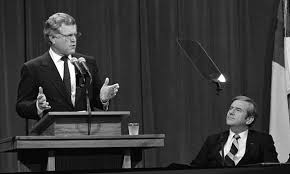Most people accustomed to the public arena have learned to not take audience opposition personally. In return, members opposed to a persuader can show unexpected forbearance.

Several decades ago I wrote a book describing a number of public figures who willingly appeared in front of “hostile audiences.” An audience is “hostile” if its known to oppose who you are or what you intend to say. Even so, these were individuals who were mostly fearless in facing their critics. I think only my mother actually read Persuasive Encounters when it was published in 1990. Yet, a least for me, the idea remains intriguing.
The book included transcripts and analyses of specific public comments made by a range of people, including Phil Donahue, Edward R. Murrow, John Lennon, Ed Koch, Ted Kennedy and psychiatrist Thomas Szasz. Szasz was an interesting case. In a number of books and addresses he went out of his way to warn his medical colleagues that they were crippling their patients by renaming their bad choices as mental health “conditions.” So much for his chances to be a future President of the American Psychiatric Association.
Senator Ted Kennedy was also a useful example. By mistake he was sent an invitation to join the “Moral Majority,” Reverend Jerry Falwell’s crusade to purge secular liberalism and governmental activism from the American political landscape. At what was then Falwell’s somewhat constricted version of higher education known as Liberty Baptist College–they still had curfews, as well as prohibitions against women going on dates–Kennedy was Exhibit “A” for why the nation had strayed from its ostensible Christian roots.
But never a person to miss the humor in our foibles, Kennedy wrote back, telling Falwell he welcomed the invitation. After long distance pleasantries to smooth over the awkward snafu, Falwell made an offer to have Kennedy address his students at Liberty. And so the Massachusetts senator went to Lynchburg in 1983, offering a general plea arguing that we should oppose “religious tests” for public office-holders. That idea remains a cornerstone of evangelicals interested in politics.
The clean-cut audience couldn’t have been more courteous. And Kennedy gave as much as he got. The speech included a generous acknowledgement of Falwell, acceptance of the value of religious belief, and a straightforward argument for tolerance of all or no faith traditions.
In my study, only New York Mayor Ed Koch responded as a rhetorical athlete, matching his audiences shout for shout. He returned a disgruntled resident’s sneer at twice its original speed and with far more topspin. At a particular public meeting held in one of the city’s districts sustained volleys between vocal citizens and the Mayor wore down even hardened veterans of municipal feuds.
Persuaders in front of hostile audiences are interesting not because they may produce charges and countercharges, but mostly because of the reverse: there is usually surprising and sudden elasticity of viewpoint in many who are involved. People accustomed to the public arena have mostly learned to not take audience opposition personally. In return, members opposed to a persuader can show unexpected forbearance.
And so a whole series of questions seem interesting. In terms of communication skills, how resourceful can a respondent be to complaints that they are “out of touch,” or are “dishonoring” the public office they hold? How focused can they remain in the face of criticism and overt disbelief? And what ideas or values can a persuader dramatize which—to quote a common phrase—affirms the idea that ‘our areas of agreement are much greater than our differences?’
Versions of this line have been delivered many times by Barack Obama and less frequently by Donald Trump. In rhetorical terms, it has been a common trope (a recurring pattern in discourse) for public figures to explicitly celebrate a common culture and shared history of beliefs. And so it reenacts what is perhaps the most universal of all communication impulses: the reaffirmation of the other’s legitimacy in the culture. Our opponents may annoy us. They might seek ways to limit our reach or effectiveness. But the basic courtesies we expect even from those with seemingly alien views are an anchor against currents that can sweep away a tenuous civility.
Comments: Woodward@tcnj.edu
